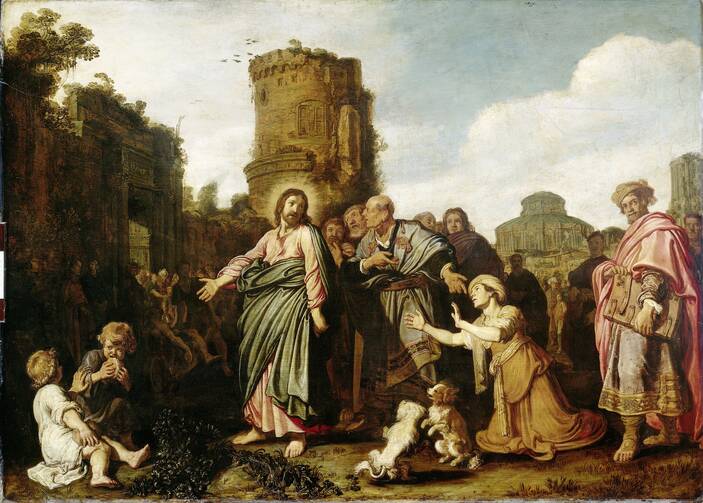A Reflection for the 20th Sunday in Ordinary Time
Readings: Isaiah 56:1, 6-7 Romans 11:13-15, 29-32 Matthew 15:21-28
What is faith? Before it is a set of statements to be professed, it is an experience, though these two elements belong to each other. We constantly cycle between communal confession and personal encounter.
You can see this in the Gospels themselves. They tell us about Jesus, but they do not do so simply to convey information. They want us to encounter Jesus. The church produced her Gospels as a way of sharing her Christ.
You glean more from the Gospels if you remember that they want you to encounter Jesus, not simply hear about him. We stand when the Gospels are read because we believe that we are welcoming Jesus, the living Word of God, who has come into our midst, come to address us.
What is faith? Before it is a set of statements to be professed, it is an experience, though these two elements belong to each other.
Think of all the stories that St. Matthew might have shared. Why does he tell us of the Canaanite woman? In hearing her story, how do we encounter Jesus?
She comes to Jesus in faith. Once again, what is faith? Faith is an experience of God. Faith happens whenever you become aware that you are not alone, that another who is not of this world is nonetheless in front of you.
This Canaanite woman is a model of faith. Jesus is away from his home ground, among the Gentiles. He is a stranger to this woman. She has only heard about him, yet she is sure that God has entered her life in the person of this Jewish prophet. Think of her resolution, the risk she runs.
How does she address this man, who is both stranger and savior?
Have pity on me, Lord, Son of David!
My daughter is tormented by a demon (Mt 15:22).
Having only heard of him, she nonetheless opens herself to him. This is what we are to do. Remember, the Gospels are both good news and guide. They proclaim Christ. He comes to us through them.
We stand when the Gospels are read because we believe that we are welcoming Jesus, the living Word of God, who has come into our midst.
What happens? Jesus does not respond to her need. Or does he? She comes, asking him for healing. Instead, he preaches to her. He offers a little parable:
It is not right to take the food of the children
and throw it to the dogs (Mt 15:26).
How often have we come here, knowing what we need, asking it fervently of the Lord, only to be met with more words? With parables and prophecies rather than solutions?
Christ does not coddle this woman. He bluntly tells her where she stands in God’s plan of salvation. Yet she is not repelled by his parable. She engages it. She receives a seemingly sterile word and ponders it into grace. Such a woman of faith! She recognizes that God is in her world, and she opens herself to him. She humbly accepts God’s judgment upon her world. Then she opens herself again. She replies to the parable:
Please, Lord, for even the dogs eat the scraps
that fall from the table of their masters (Mt 15:27).
And then she hears:
O woman, great is your faith!
Let it be done for you as you wish (Mt 15:28).
What is faith? It is a recognition that we are in the presence of someone not of this world. Not that we see God. In this world, God is not given to our sight. The Canaanite woman sees only a prophet, but she perceives God in him. First, she opens herself to the God beyond the man and receives a word, a teaching, the good news of salvation, the Gospel. Then she opens herself to this as well, and she is healed. What is faith? We perceive. We open. We listen. We receive, and we live.
More on this Sunday’s readings:
- The Gospel message is for everyone, by Jamie L. Waters
- Evangelization 101 for circumspect Catholics, by the Rev. Terrance Klein (2017)








